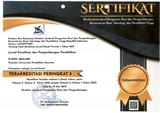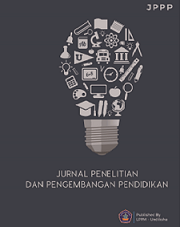Digital Literacy Profile of Indonesian Educational Technology Students in the Era of Digital Transformation
DOI:
https://doi.org/10.23887/jppp.v8i2.82120Keywords:
Digital Literacy, Educational Technology Students, Digital TransformationAbstract
The development of digital technology has led to fundamental changes in the industrial world, known as the industrial transformation of the digital era. One of the serious challenges in education regarding digital technology resources is the ability to control them through algorithmic systems. This research aims to analyze and map the profile of Educational Technology students, particularly Generation Z, who are now in an increasingly mediated and digitalized learning environment. The research employs a quantitative approach with a descriptive research design. The sampling method used is total sampling, where the entire population is selected as the research sample. Data collection is conducted using a questionnaire as the instrument. The data analysis techniques include both qualitative and quantitative descriptive analysis. The research findings reveal three categories of digital literacy competencies among Indonesian Educational Technology students: communicative power, selective power, and digital-based creation. Communicative power relates to elements such as social networking, transliteracy, identity management, and self-broadcasting. The digital literacy competency related to communicative skills is categorized as very good, as is the ability to select various digital content when accessing internet-based media. However, the digital literacy competency related to creative power is in the good category, tending towards quite good.
References
Ahmadi, F., Sutaryono, Witanto, Y., & Ratnaningrum, I. (2017). Pengembangan Media Edukasi “Multimedia Indonesian Culture” (Mic) Sebagai Penguatan Pendidikan Karakter Siswa Sekolah Dasar. Jurnal Penelitian Pendidikan, 34(2), 127–136. https://doi.org/10.15294/jpp.v34i2.12368.
Akbar, A., & Noviani, N. (2019). Tantangan dan Solusi dalam Perkembangan Teknologi Pendidikan di Indonesia. Prosiding Seminar Nasional Pendidikan Program Pascasarjana Universitas Pgri Palembang, 2(1), 18–25.
Asari, A., Kurniawan, T., Ansor, S., & Putra, A. B. N. R. (2019). Kompetensi Literasi Digital Bagi Guru Dan Pelajar Di Lingkungan Sekolah Kabupaten Malang. BIBLIOTIKA : Jurnal Kajian Perpustakaan dan Informasi, 3(2). https://doi.org/10.17977/um008v3i22019p98-104.
Bertram, C., Weiss, Z., Zachrich, L., & Ziai, R. (2021). Artificial intelligence in history education. Linguistic content and complexity analyses of student writings in the CAHisT project (Computational assessment of historical thinking). Computers and Education: Artificial Intelligence. https://doi.org/10.1016/j.caeai.2021.100038. DOI: https://doi.org/10.1016/j.caeai.2021.100038
Cindrakarsih, R. R. (2020). Efektivitas pembelajaran daring menggunakan media online selama pandemi covid-19 pada mata kuliah Pik dalam pandangan mahasiswa. Jurnal Public Relations-Jpr, 1(April), 39–44.
Fadhilah, R. E. (2019). Analisis Kebutuhan Pengembangan Buku Ajar Biologi Umum Materi Bioteknologi Berbasis Penelitian Untuk Mahasiswa S1 Pendidikan Biologi Insttitut Teknologi Dan Sains Nahdlatul Ulama Pasuruan. Education and Human Development Journal, 4(1), 89–95. https://doi.org/10.33086/ehdj.v4i1.1087. DOI: https://doi.org/10.33086/ehdj.v4i1.1087
Faliyandra, F. (2020). Model Komunikasi Pendidikan di Sosial Media Pada Era Perkembangan Teknologi. International Journal of Islamic Studies and Social Sciences, 1(3), 434–459. https://doi.org/10.56613/islam-universalia.v1i3.140. DOI: https://doi.org/10.56613/islam-universalia.v1i3.140
Farahiba, A. S. (2018). Pembelajaran Sastra Berkarakter Humanis Untuk Generasi Z. Jurnal Pendidikan Bahasa dan Sastra Indonesia Metalingua, 3(2). https://doi.org/10.21107/metalingua.v3i2.7035. DOI: https://doi.org/10.21107/metalingua.v3i2.7035
Fikri, M., Ananda, M. Z., & Faizah, N. (2021). Kendala Dalam Pembelajaran Jarak Jauh di Masa Pandemi Covid-19 : Sebuah Kajian Kritis. Jurnal Education and development, 9(1), 145–148. https://doi.org/10.37081/ed.v9i1.2290.
Firamadhina, F. I., & Krisnani, H. (2020). Perilaku Generasi Z Terhadap Penggunaan Media Sosial Tiktok: Tiktok Sebagai Media Edukasi Dan Aktivisme. Social Work Jurnal, 10(2). https://doi.org/10.24198/share.v10i2.31443. DOI: https://doi.org/10.24198/share.v10i2.31443
Firmadani, F. (2020). Media Pembelajaran Berbasis Teknologi Sebagai Inovasi Pembelajaran Era Revolusi Industri 4.0. Prosiding Konferensi Pendidikan Nasional, 2(1), 93–97.
Ginanjar, A., Putri, N. A., Nisa, A. S., Hermanto, F., & Mewangi, A. B. (2019). Implementasi Literasi Digital Dalam Proses Pembelajaran Ips Di Smp Al-Azhar 29 Semarang. Harmony, 4(2), 99–105.
Hasan Lubis, A., & Darwis Dasopang, M. (2020). Pengembangan Buku Cerita Bergambar Berbasis Augmented Reality untuk Mengakomodasi Generasi Z. Jurnal Pendidikan: Teori, Penelitian, dan Pengembangan, 05(06), 780–791. https://doi.org/10.17977/jptpp.v5i6.13613. DOI: https://doi.org/10.17977/jptpp.v5i6.13613
Hasir, H., & Sohrah, S. (2021). Tindakan Bullying di Media Sosial; Komparasi Hukum Pidana Islam dan Undang-Undang Nomor 19 Tahun 2016 Tentang ITE. Shautuna: Jurnal Ilmiah Mahasiswa Perbandingan Mazhab dan Hukum, 9(2020), 704–712. https://doi.org/10.24252/shautuna.v2i3.21577.
Hendratmoko, T., Kuswandi, D., & Setyosari, P. (2018). Tujuan Pembelajaran Berlandaskan Konsep Pendidikan Jiwa Merdeka Ki Hajar Dewantara. JINOTEP (Jurnal Inovasi dan Teknologi Pembelajaran): Kajian dan Riset Dalam Teknologi Pembelajaran, 3(2). https://doi.org/10.17977/um031v3i22017p152.
Hidayati, N., Hani Saputro, Z., & Lestari, T. (2022). Implementasi Pembelajaran Projek pada Sekolah Penggerak di Era Digital. Journal of Education and Teaching (JET), 4(1), 68–82. https://doi.org/10.51454/jet.v4i1.200. DOI: https://doi.org/10.51454/jet.v4i1.200
Junjunan, I. M. (2019). Mendidik Dan Mengajar Generasi Post Millennialss: Pendekatan Untuk Mendidik Generasi Z, Sebagai Suplemen Bagi Pendekatan Klasik Pendidikan. JIPSI : Jurnal Ilmiah Psikologi, 1(1), 1–8. https://doi.org/10.37278/jipsi.v1i1.230. DOI: https://doi.org/10.37278/jipsi.v1i1.230
Khoirroni, I. A., Patinasarani, R., Hermayanti, N. I., & Santoso, G. (2023). Pendidikan Karakter: Tingkat Anak Sekolah Dasar di Era Digital. Jurnal Pendidikan Transformatif, 2(2), 269–279. https://doi.org/10.9000/jpt.v2i2.372.
Kurnia, N., & Astuti, S. I. (2017). Peta Gerakan Literasi Digital di Indonesia: Studi Tentang Pelaku, Ragam Gerakan, Kelompok Sasaran dan Mitra. Informasi Kajian Ilmu Komunikasi, 47(2), 149–166. https://doi.org/10.21831/informasi.v47i2.16079. DOI: https://doi.org/10.21831/informasi.v47i2.16079
Kurnianingsih, I., Rosini, R., & Ismayati, N. (2017). Upaya Peningkatan Kemampuan Literasi Digital Bagi Tenaga Perpustakaan Sekolah dan Guru di Wilayah Jakarta Pusat Melalui Pelatihan Literasi Informasi. Jurnal Pengabdian kepada Masyarakat (Indonesian Journal of Community Engagement), 3(1), 61. https://doi.org/10.22146/jpkm.25370. DOI: https://doi.org/10.22146/jpkm.25370
Liza, K., & Andriyanti, E. (2020). Digital Literacy Scale of English Pre-Service Teachers and Their Perceived Readiness toward the Application of Digital Technologies. Journal of Education and Learning (EduLearn), 14(1), 74–79. https://doi.org/10.11591/edulearn.v14i1.13925. DOI: https://doi.org/10.11591/edulearn.v14i1.13925
Magdalena, I., Fauziyyah, B. S., Afiani, R., & Fushilat, L. A. (2020). Inovasi Teknologi Dalam Pembelajaran Pada Masa Pandemi Covid-19 Di Mi Nurul Yaqin. Pensa: Jurnal Pendidikan dan Ilmu Sosial, 2(3).
Makarova, E. A., & Makarova, E. L. (2018). Blending pedagogy and digital technology to transform educational environment. International Journal of Cognitive Research in Science, Engineering and Education, 6(2), 57–65. https://doi.org/10.5937/ijcrsee1802057M. DOI: https://doi.org/10.5937/ijcrsee1802057M
Mambu, J. G. Z., Pitra, D. H., Rizki, A., Ilmi, M., Nugroho, W., & Natasya, V. (2023). Pemanfaatan Teknologi Artificial Intelligence ( AI ) Dalam Menghadapi Tantangan Mengajar Guru di Era Digital. Jounarl On Education, 06(01), 2689–2698. https://doi.org/10.31004/joe.v6i1.3304.
Maritsa, A., Hanifah Salsabila, U., Wafiq, M., Rahma Anindya, P., & Azhar Ma’shum, M. (2021). Pengaruh Teknologi Dalam Dunia Pendidikan. Al-Mutharahah: Jurnal Penelitian dan Kajian Sosial Keagamaan, 18(2), 91–100. https://doi.org/10.46781/al-mutharahah.v18i2.303. DOI: https://doi.org/10.46781/al-mutharahah.v18i2.303
Muhammad Yahya, Wahyudi, & Akmal Hidayat. (2023). Implementasi Artificial Intelligence (AI) di Bidang Pendidikan Kejuruan Pada Era Revolusi Industri 4.0. Seminar Nasional Dies Natalis 62, 1, 190–199. https://doi.org/10.59562/semnasdies.v1i1.794. DOI: https://doi.org/10.59562/semnasdies.v1i1.794
Nisa’, L. (2020). Pemanfaatan Teknologi Dalam Pendidikan Anak Usia Dini. ThufuLA: Jurnal Inovasi Pendidikan Guru Raudhatul Athfal, 8(1), 001. https://doi.org/10.21043/thufula.v8i1.6283. DOI: https://doi.org/10.21043/thufula.v8i1.6283
Pee, S. J., Kang, E. S., Song, J. G., & Jang, J. W. (2019). Blockchain based smart energy trading platform using smart contract. 2019 International Conference on Artificial Intelligence in Information and Communication (ICAIIC), 322–325. DOI: https://doi.org/10.1109/ICAIIC.2019.8668978
Pratikno, A. S. (2017). Implementasi Artificial Intelligence dalam Memetakan Karakteristik, Kompetensi, dan Perkembangan Psikologi Siswa Sekolah Dasar Melalui Platform Offline Conference. Proceeding KMP Education Research Conference Keluarga Mahasiswa Pascasarjana (KMP), 18–27.
Primasari, Ika Firma Ningsih Dian, & Zulela. (2021). Kendala Pembelajaran Jarak Jauh (PJJ) Secara Online Selama Masa Pandemik Covid-19 di Sekolah Dasar. JIKAP PGSD: Jurnal Ilmiah Ilmu Kependidikan, 5(1), 64–73. https://doi.org/10.26858/jkp.v5i1.16820. DOI: https://doi.org/10.26858/jkp.v5i1.16820
Putri, I. I. M., Rmiyanti, R., & Ningsih, E. R. (2020). Realisasi Gerakan Literasi Digital Sebagai Implementasi Gerakan Literasi Nasional Di Sekolah Muhammadiyah Pangkalan Bun. Buletin Literasi Budaya Sekolah, 2(2), 87–99. https://doi.org/10.23917/blbs.v2i2.12836. DOI: https://doi.org/10.23917/blbs.v2i2.12836
Qodr, T. S., Efendi, A., & Musadad, A. A. (2021). Opportunities for Using Smartphones in the Digital Era to Facilitate Students in Learning Sociology in High Schools. Journal of Education Technology, 5(2), 263–271. https://doi.org/10.23887/jet.v5i2.34806. DOI: https://doi.org/10.23887/jet.v5i2.34806
Rastati, R. (2018). Media Literasi Bagi Digital Natives: Persektif Generasi Z Di Jakarta. Kwangsan: Jurnal Teknologi PendidikanJurnal Teknologi Pendidikan, 6(1). https://doi.org/10.31800/jtp.kw.v6n1.p60--73. DOI: https://doi.org/10.31800/jtp.kw.v6n1.p43--57
Rezka, I. F., & Hamzah, R. E. (2021). Studi Resepsi Tvc Sasa Versi “Welcome Back Micin Swag Generation” Terhadap Generasi Y Dan Z. Jurnal Dinamika Ilmu Komunikasi, 7(1), 16–29.
Rizaldi, D. R., Nurhayati, E., & Fatimah, Z. (2020). The Correlation of Digital Literation and STEM Integration to Improve Indonesian Students’ Skills in 21st Century. International Journal of Asian Education, 1(2), 73–80. https://doi.org/10.46966/ijae.v1i2.36. DOI: https://doi.org/10.46966/ijae.v1i2.36
Rusmiyanto, Huriati, N., Fitriani, N., & Tyas, N. K. (2023). The Role Of Artificial Intelligence (AI) In Developing English Language Learner’s Communication Skills Rusmiyanto1,. 2023 14th International Conference on Computing Communication and Networking Technologies, ICCCNT 2023, 06(01), 750–757. https://doi.org/10.1109/ICCCNT56998.2023.10307203.
Salsabila, U. H., Ilmi, M. U., Aisyah, S., Nurfadila, N., & Saputra, R. (2021). Peran Teknologi Pendidikan dalam Meningkatkan Kualitas Pendidikan di Era Disrupsi. Journal on Education, 3(01), 104–112. https://doi.org/10.31004/joe.v3i01.348. DOI: https://doi.org/10.31004/joe.v3i01.348
Sestiani, R. A., & Muhid, A. (2022). Pentingnya Dukungan Sosial Terhadap Kepercayaan Diri Penyintas Bullying: Literature Review. Jurnal Tematik, 3(2), 245–251. https://doi.org/10.26623/tmt.v3i2.4568.
Siahaan, M., Jasa, C. H., Anderson, K., Rosiana, M. V., Lim, S., & Yudianto, W. (2020). Penerapan Artificial Intelligence (AI) Terhadap Seorang Penyandang Disabilitas Tunanetra. Journal of Information System and Technology (JOINT), 1(2), 186–193. https://doi.org/10.37253/joint.v1i2.4322.
Siswanto, S., Zaelansyah, Z., Susanti, E., & Fransiska, J. (2019). Metode Pembelajaran Anak Usia Dini Dalam Generasi Unggul Dan Sukses. Paramurobi: Jurnal Pendidikan Agama Islam, 2(2), 35–44. https://doi.org/10.32699/paramurobi.v2i2.1295. DOI: https://doi.org/10.32699/paramurobi.v2i2.1295
Subandowo, M. (2017). Peradaban dan Produktivitas dalam Perspektif Bonus Demografi serta Generasi Y dan Z. Sosiohumanika: Jurnal Pendidikan Sains Sosial dan Kemanusiaan, 10(2). https://doi.org/10.2121/sosiohumanika.v10i2.920.
Sugiyono. (2019). Metode Penelitian Kuantitatif Kualitatif dan Penelitian dan Pengembangan.
Triwidiya, L. (2021). Falsafah dan perkembangan kerangka konsep teknologi pembelajaran. Universitas Muhammadiyah Sidoarjo.
Widodo, A., Indraswati, D., Sutisna, D., Nursaptini, & Anar, A. P. (2020). Pendidikan IPS Menjawab Tantangan Abad 21 : Sebuah Kritik Atas Praktik Pembelajaran IPS di Sekolah Dasar dikuasai siswa dalam menghadapi abad 21 hanyalah kemampuan terhadap teknologi dan. Jurnal Pendidikan Ilmu Pengetahuan Sosial dan Ilmu-Ilmu Sosial, 2(2), 186–198. https://doi.org/10.19105/ejpis.v2i2.3868. DOI: https://doi.org/10.19105/ejpis.v2i2.3868
Wijoyo, H., Indrawan, I., Cahyono, Y., Handoko, A. L., & Santamoko, R. (2020). Generasi Z & Revolusi Industri 4.0. In Gastronomía ecuatoriana y turismo local. (Vol 1, Number 69). CV. Pena Persada.
Wulandari, B. A., Norawati, R., Anastasia, I., Ridha, A., & Heryanti, R. (2021). Penggunaan Portofolio Digital Untuk Mendorong Pembelajaran Refleksi dan Mandiri. Jurnal Karya Abdi …, 5(3), 356–362.
Downloads
Published
How to Cite
Issue
Section
License
Copyright (c) 2024 Murti Kusuma Wirasti, Ramadhan Hamam Irawan, Mulyadi

This work is licensed under a Creative Commons Attribution-ShareAlike 4.0 International License.
Authors who publish with the Jurnal Penelitian dan Pengembangan Pendidikan agree to the following terms:
- Authors retain copyright and grant the journal the right of first publication with the work simultaneously licensed under a Creative Commons Attribution License (CC BY-SA 4.0) that allows others to share the work with an acknowledgment of the work's authorship and initial publication in this journal.
- Authors are able to enter into separate, additional contractual arrangements for the non-exclusive distribution of the journal's published version of the work (e.g., post it to an institutional repository or publish it in a book), with an acknowledgment of its initial publication in this journal.
- Authors are permitted and encouraged to post their work online (e.g., in institutional repositories or on their website) prior to and during the submission process, as it can lead to productive exchanges, as well as earlier and greater citation of published work. (See The Effect of Open Access)







